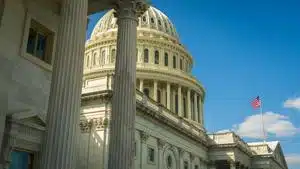(The Center Square) – Cities that host the NFL Draft have seen small increases in hotel revenue in recent years but those gains are far smaller than what is claimed by teams, the National Football League and the marketing and tourism departments in local government have claimed.
The first three cities to host the draft after it left New York saw insignificant changes in hotel stays during the event while host cities since 2019 have seen between $4 million and $6 million in hotel revenue increases due to the event, according to a new paper provided to The Center Square from economist E. Frank Stephenson from Georgia’s Berry College.
Green Bay hosted the event in 2025 while Pittsburgh will host in 2026 and Washington, D.C. in 2027. All three claimed that large economic impacts would occur when hosting the event.
“The net gain in room rentals in the 2019-2024 host cities varies greatly from a decrease of nearly 20,000 room nights in Las Vegas to an increase of about 9,000 room nights in Nashville, but in all cases is a small fraction of the claimed number of people attending draft-related events,” Stephenson wrote. “Thus, the overwhelming majority of visitors are local residents or day-trippers and much of their spending is likely redirected from other local entertainment or dining options rather than being economic gains for the host cities.”
Stephenson wrote the paper hoping to shed light on annual claims by entities involved of large economic impacts related to hosting the event, used to justify spending on the event.
The paper comes as Experience Greater Green Bay and the Green Bay Packers claimed last week that there was an economic impact of $73 million in Brown County and nearly $105 million statewide.
Green Bay relied on surveys from marketing firm Sportsimpacts, which claimed that 50% of those attending the draft were from Brown County or day-trippers while 31% of attendees were from outside Wisconsin and 24% paid for overnight lodging with 29% staying in Brown County and 21% in Outagamie County.
Stephenson’s hotel data analysis ran through 2024, when Detroit hosted the draft. But the data consistently showed smaller impacts despite claims that hosting the draft had more than a $200 million impact on the Detroit area.
Wisconsin leaders claimed the event would have an economic impact of $94 million in the state and $20 million in the Green Bay area when attempting to divert public funding to the event.
“Every year these bogus economic claims about the NFL draft come out,” economist J.C. Bradbury wrote about the Green Bay tourism estimates heading into the event. “Economists haven’t studied it directly because it makes no sense. But we really could use an actual serious study to counteract this BS PR.”
The Las Vegas decrease in hotel stays for the draft are similar to when the city hosted the Super Bowl and Formula 1 Las Vegas Grand Prix, when it saw an increase in hotel rates but not occupancy.
Kansas City saw an increase in hotel rates and stays for the night before the draft and first two nights of the draft but then saw drops in hotel stays the third night of the draft and the night after that, what economists call the hangover effect of deterring regular guests after a large event.
“The cumulative effects … indicate a net gain of 4,416 room rentals and $4.98 million in hotel revenue,” Stephenson wrote. “While the effects in Kansas City are relatively large compared to all other host cities except Nashville, they do not support claims of a $60 million increase in lodging spending.
“As for other events, the Kansas City Chiefs increase room rentals by about 8,900 rooms and hotel revenue by $1.9 million per home game.”
The Detroit draft, meanwhile, led to a net increase of 2,800 room nights and approximately $5 million in additional hotel revenue compared to an increase of about 900 room nights and $450,000 in hotel revenue for each home Detroit Lions game.
“While a few host cities—Nashville, Kansas City, and Detroit—experience positive hotel occupancy effects, they are far short of claims about the event’s economic impact,” Stephenson wrote. “Moreover, even the modest positive hotel occupancy increases found in some cities are subject to leakages and may not benefit the host city’s economic conditions.”


















































